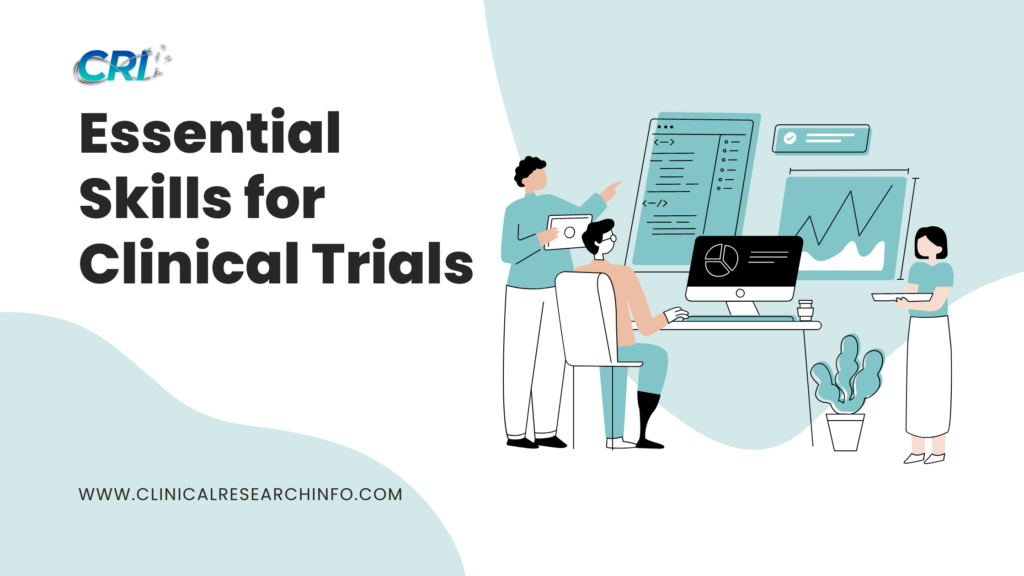Clinical trials are complex endeavors that require the collaboration of various departments, each with specialized skills and expertise. These departments work synergistically to ensure the safe, ethical, and effective conduct of trials. Below, we delve into the essential skills required for key departments involved in clinical trials.
1. Clinical Operations
Clinical Operations is the backbone of clinical trials, managing the day-to-day activities to ensure the trial runs smoothly.
Essential Skills:
- Project Management: Ability to plan, initiate, execute, monitor, and close projects.
- Regulatory Knowledge: Understanding of regulatory requirements and guidelines (e.g., FDA, EMA).
- Communication: Strong verbal and written communication skills for coordinating with various stakeholders.
- Problem-Solving: Aptitude for addressing and resolving issues that arise during the trial.
- Detail-Oriented: Meticulous attention to detail for managing trial documentation and protocols.
2. Clinical Data Management
This department is responsible for collecting, processing, and ensuring the integrity of trial data.
Essential Skills:
- Data Handling: Proficiency in data entry, database management, and ensuring data accuracy.
- Analytical Skills: Ability to analyze data trends and identify anomalies.
- Software Proficiency: Familiarity with data management systems like EDC (Electronic Data Capture) and CTMS (Clinical Trial Management Systems).
- Attention to Detail: Ensuring the accuracy and completeness of data.
- Regulatory Knowledge: Understanding data privacy laws (e.g., GDPR, HIPAA) and regulatory requirements.
3. Biostatistics
Biostatisticians play a crucial role in designing the trial and analyzing the data to draw meaningful conclusions.
Essential Skills:
- Statistical Analysis: Expertise in statistical methods and software (e.g., SAS, R).
- Study Design: Knowledge of various study designs and methodologies.
- Critical Thinking: Ability to interpret complex data and provide insights.
- Programming: Proficiency in statistical programming languages.
- Communication: Ability to explain statistical concepts to non-statisticians.
4. Clinical Monitoring
Clinical monitors ensure the trial is conducted according to the protocol and regulatory requirements.
Essential Skills:
- Attention to Detail: Thoroughly reviewing trial documentation and site activities.
- Regulatory Knowledge: Understanding of GCP (Good Clinical Practice) and other relevant guidelines.
- Communication: Strong interpersonal skills for interacting with site staff.
- Problem-Solving: Identifying and resolving site-related issues.
- Travel Flexibility: Willingness to travel frequently to various trial sites.
5. Medical Writing
Medical writers produce the documentation necessary for regulatory submissions and publication.
Essential Skills:
- Writing Proficiency: Excellent writing skills for clear, concise, and accurate documentation.
- Scientific Knowledge: Understanding of medical and scientific concepts.
- Attention to Detail: Ensuring accuracy and consistency in documents.
- Regulatory Knowledge: Familiarity with regulatory submission requirements.
- Project Management: Ability to manage timelines and coordinate with multiple departments.
6. Regulatory Affairs
This department ensures that the trial complies with all regulatory requirements.
Essential Skills:
- Regulatory Knowledge: In-depth understanding of global regulatory requirements.
- Communication: Ability to effectively communicate with regulatory agencies.
- Attention to Detail: Preparing precise and compliant regulatory documents.
- Problem-Solving: Addressing regulatory issues and challenges.
- Project Management: Coordinating submission timelines and regulatory strategies.
7. Quality Assurance
Quality Assurance ensures that all trial activities adhere to SOPs (Standard Operating Procedures) and regulatory standards.
Essential Skills:
- Auditing: Conducting internal and external audits to ensure compliance.
- Attention to Detail: Identifying and addressing deviations and non-compliance.
- Regulatory Knowledge: Understanding of GCP and other quality standards.
- Problem-Solving: Implementing corrective and preventive actions.
- Communication: Providing training and guidance on quality issues.
8. Clinical Pharmacology
This team studies the effects, mechanisms, and metabolism of the investigational product.
Essential Skills:
- Scientific Knowledge: Understanding of pharmacokinetics and pharmacodynamics.
- Analytical Skills: Interpreting complex pharmacological data.
- Regulatory Knowledge: Familiarity with regulatory guidelines for pharmacology studies.
- Attention to Detail: Ensuring accurate and reliable study results.
- Communication: Effectively presenting findings to stakeholders.
9. Ethics and Compliance
This department ensures that the trial adheres to ethical standards and protects participant rights.
Essential Skills:
- Ethical Knowledge: Understanding of ethical principles in clinical research.
- Regulatory Knowledge: Familiarity with regulations regarding informed consent and participant protection.
- Communication: Educating and informing trial participants and staff.
- Attention to Detail: Ensuring all ethical guidelines are followed meticulously.
- Problem-Solving: Addressing ethical issues and ensuring compliance.
10. Investigator Site Management
The investigators and their teams at the trial sites are crucial for executing the trial protocol.
Essential Skills:
- Medical Expertise: In-depth knowledge of the therapeutic area and investigational product.
- Patient Interaction: Strong skills in patient recruitment and retention.
- Regulatory Knowledge: Understanding of trial protocols and regulatory requirements.
- Attention to Detail: Ensuring accurate data collection and reporting.
- Communication: Coordinating with the sponsor and CRO (Contract Research Organization).
Conclusion
Each department in clinical trials plays a vital role and requires a unique set of skills to contribute effectively to the trial’s success. Mastery of these skills ensures that clinical trials are conducted efficiently, ethically, and in compliance with regulatory standards, ultimately leading to the development of safe and effective medical treatments.



